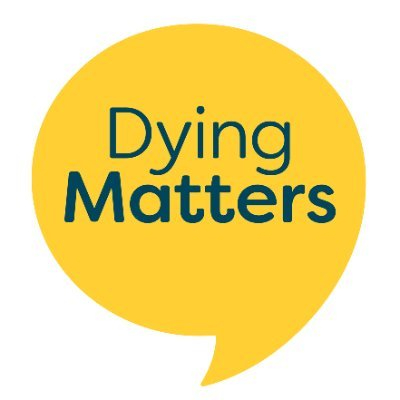Dying Matters Awareness Week Blog - Dr David Crichton
Each year the national Dying Matters Awareness Week is an opportunity to encourage everyone to get talking in whatever way, shape, or form they can about death and the end of lives. The campaign, which takes place this year between 8 and 14 May, aims to open up a culture that feels comfortable with talking about death, and helps people to be able to listen and support those who are planning for their care needs and also those who have been bereaved.
As a nation, in the UK, we often struggle to have conversations about death with big questions such as, where we die, who we want with us and what care and support we have in place. We know that talking about death isn’t easy and it still feels a taboo subject to discuss with others and those close to us. However, it’s important that we all know what it means for individuals and our loved-ones to ensure they are in a good place physically, emotionally, and crucially with the right care and support in place when they die.
Early conversations can be recorded and communicated to others using forms such as the ReSPECT (Recommended Summary Plan for Emergency Care and Treatment) tool to ensure professionals who care for us and loved ones understand a person’s wishes. This process creates a personalised summary of recommendations for a person’s clinical care in a future emergency in which they do not have capacity to make or express choices.
Dying Matters aims is to help people to talk openly about dying and grief, and plan for our end of life. As a healthcare system, we want to start these conversations early enough to ensure we can support peoples wishes and ensure services meet the needs of individuals. By coming together, we can show that talking about dying doesn’t bring death closer, it’s mainly about planning and helping us make the most of the time that we have. Understandably, we don’t want to upset people, or sound gloomy but commonly families report that it comes as a relief once the subject is brought out into the open and they can express their wishes about how they’d like to die, or what they would like to happen after death.
Often in difficult situations we tend to search for the ‘right’ thing to say, or we deny what’s happening altogether. Whilst this is natural, dying is a profound process that needs honesty and understanding. Open conversations can be very liberating, both for the dying person and their loved ones. Let the person know they can talk to you if they need to. You might say, “If there ever comes a time when you want to talk about something, please do tell me”. This gives them permission to talk in their own time, without any expectations.
People can have very different reactions to death depending on their attitudes, beliefs and the relationship they have with the person who is dying. It’s important to take their individual feelings into consideration and avoid pushing anyone into talking if they don’t want to. Don’t feel you have to talk all the time. Simply being beside someone in silence can be hugely comforting.
Hearing the sad news that someone you love, or a friend of yours, has been diagnosed with a life-limiting condition will come as a big shock and learning to cope with an palliative diagnosis is very difficult. Hearing that someone close to you has attempted or committed suicide will also come as a big shock. However, there is lots of information, local support groups, and professionals (such as bereavement counsellors) to help you if you are struggling to cope with a terminal diagnosis or bereavement and grief.
You may find talking to a therapist, counsellor, or attending a local support group beneficial. It is common to feel lots of different emotions, including numbness, shock, anger, sadness and even denial. You can access bereavement counselling via your local GP, a local counselling service or charities that specialise in grief and bereavement.
There are also lots of information pages on the Dying Matters website which can be accessed here to provide advice to support you and your family through these difficult times.
The Dying Matters Awareness Week for 2023 will be focussing on Dying Matters At Work. Stigma around grieving, and a lack of understanding about what it means to be ill and what happens when you’re dying, mean that too many of us are struggling to cope when faced with life’s inevitable challenges. And the workplace is no exception.
We spend so much of our lives at work – and we shouldn’t have to hide our experiences of death and dying from our colleagues, our peers, or our bosses. By talking to those around you, you can help make sure that workplaces are properly set up to support people who are ill, who are caring for those around them, or who have lost someone close to them. We would encourage all employers and employees to join in Dying Matters Awareness Week from 8 – 14 May and help to make your workplace an open and compassionate environment.
